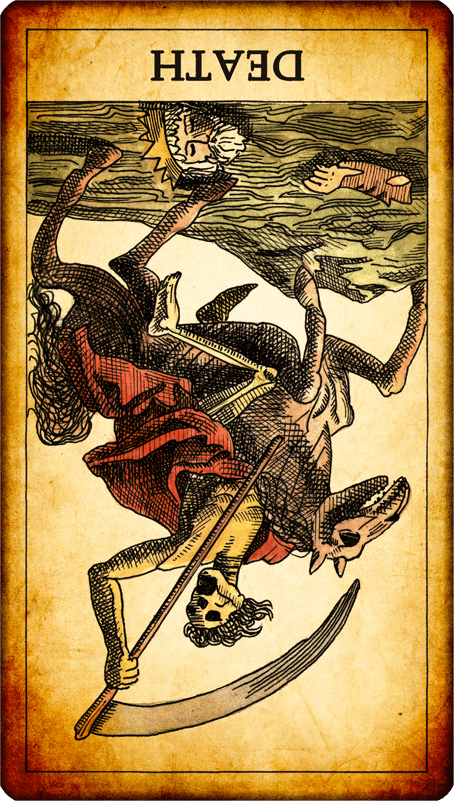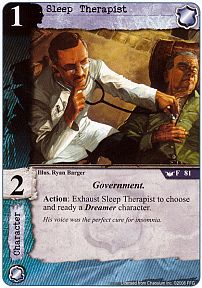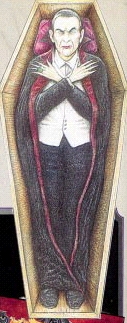
You have to sleep to let your soul
into my heart -
A National Thief-Acrobat, by God
(covered by BLACK
SABBATH).

You have to sleep to let your soul
into my heart -
A National Thief-Acrobat, by God
(covered by BLACK
SABBATH).
|
|
|
|
|
|
|
|
|
|
|
|
Adventurers are a hardy
lot -- they have to be, or they don't remain live adventurers for
very long.
But even the toughest barbarian
needs to REST frequently in order to remain in top condition.
And it is not only the quantity
of REST that is important -- the quality of
the REST makes a difference, too.

"But we must ride more warily; for war is abroad, and the Rohirrim, the Horse-lords, do not sleep, even if it seems so from afar." - Gandalf, The Two Towers
To remain in the
best possible physical && mental condition, a
character should spend no more than 16
hours per day in active
adventuring pursuits -- travelling, fighting,
etc.
(This "active time"
includes REST stops take to avoid
fatigue, which
do not
count as actual REST for the prespos of
these rules.) <alt>
The remainder
of each day is the time that should be
set aside for making
camp, eating, and
sleeping. Setting up a shelter, hunting &&
foraging,
and cooking or preparing the nighttime
meal should all be
able to be done in three hours at most,
with perhaps a little time
left over for boasting around the campfire.
And then it's time
for {sleep}.
A character needs five
hours of ![]() every 24h to avoid
the risk of ill effects from lack of REST.
every 24h to avoid
the risk of ill effects from lack of REST.
If he is not properly rested,
the ill effects may no show up right away,
and might not manifest themselves at all
if he is lucky.
On the other hand,
his lack of REST might
come
back to {haunt} him at a very inopportune
time.
Table 37: EFFECTS OF LACK OF SLEEP
| Average Rest
Per Day |
Effects |
| Less than 5 | * DEX Checks at +1 |
| Less than 4 | * DEX
Checks at +2
* STR Checks at +1 * -1 "to hit" |
| Less than 3 | * DEX
Checks at +3
* STR Checks at +2 * WIS Checks at +1 * -1 "to hit" * Climbing Rating -10% * Movement Rate -25% |
| Less than 2 | * DEXChecks
at +4
* STRChecks at +3 * WISChecks at +2 * CONChecks at +1 * -2 "to hit" * Climbing Rating -20% * Movement Rate -33% * Weight Allowance -5# x STR |
| Less than 1 | * DEX
Checks at +5
* STR Checks at +4 * WIS Checks at +3 * CON Checks at +2 * -3 "to hit" * Climbing Rating -30% * Movement Rate -50% * Weight Allowance -10# x STR |
The effects on the preceding
table do NOT set in until a character
has gone for 2 days without getting at
least 5 hours of
sleep during one of those days.
He can stay up all night and function
normally during the next day, but if he doesn't get at
least <five> hours of ![]() on the following night then the effects will
on the following night then the effects will
begin at sunrise or when he awakens. <(see
Hours
of Daylight)>
Average REST
Per Day is calculated on a day-by-day basis
whenever a character goes for 2
or more consecutive days
without getting at least five hours of
sleep during one of those
days. As soon as he gets five hours of
sleep in a single day, any
and all effects are negated; the character
is physically && mentally
replenished by the simple act of getting
one good night's
sleep, even if he has been deprived of
sufficient sleep for several
days in a row.
"DEX
Checks
at +1" and similar entries mean that hte
given modifier is applied to the die roll
whenever an Ability Check ||
a Skill Check related to the indicated
ability is called for.
The "Movement
Rate" entries are expressed as a reduction of
the character's normal large-scale movement
rate. This reduction
is taken after all other adjustments (for
terrain, encumbrance,
etc.) are accounted for. The penalty does
not apply to
combat situations or at other times when
movement is considered
as feet per round instead of miles per
half-day. For instance,
a character with a normal movement rate
of 12" can travel only 6
miles per half-day on foot if he is operating
with less than 1 hour of
sleep. However, if he is ambushed along
the way, he can still
move at 12" while the combat episode is
being resolved.

64
The "Weight Allowance"
entries mean that a character's carrying
capacity is reduced by the indicated amount
(50 or 100 <correct/clarify this>
times his strength score, in gold pieces)
and his encumbrance
status may also change because of his
diminished ability to carry
equipment.
Examples:
A character
gets four hours of sleep one night and four hours
the next. Beginning on the
following morning, he has a slightly
smaller chance of succeeding
on a DEX Check or a Proficiency
Check related to dexterity.
If he continues to get only four
hours of sleep a night,
this condition will persist. It will disappear
as soon as he gets at least
five hours of sleep in a single day.
A character
with a STR of 10 goes without sleep for a full
day, and suffers no ill
effects the following day. But he is unable
to get a full night's sleep
the following night and has to settle for
three hours of slumber.
When he awakens, the effects of his lack <>
of REST (less than 2 hours
per day for the preceding two days) begin. <>
Before he went to sleep,
he took off the gear he was wearing
and carrying, which amounted
to 1050 gp of ENC
value. Now, when he tries
to put it all back on, he discovers
that he cannot walk with
such a heavy load. (His carrying
capacity has decreased by
50 x 10, or 500, gp, so he
cannot carry more than 1000
gp of ENC and even if he
does so, he will be severly
encumbered instead of heavily encumbered.)
If he makes it through the
day under these burdensome
conditions, he can fully
refresh himself by getting five hours <>
of sleep that night. He
can also replenish himself by immediately
lying down and snoozing
for another two hours, which would give <>
him a total of five hours
of sleep during the present day. <>


The phrase "a good night's
REST" speaks to the quality of the REST, not the night.
For a character to fully benefit from
his sleeping time, he must be able to REST
in comfort --
which isn't always easy to achieve in
the
wilderness.
If a character is trying
to sleep when any of the following conditions xist,
the amount of "good REST" he gets is reduced
accordingly:
| -1 hour | Character not prone or in relaxed position |
| -1 hour | Lying on bare ground (no bedding or padding)* |
| -1 hour | Personal temperature below 0 degrees |
| -2 hours | Personal temperature above 90 degrees |
| -2 hours | Wind of 20 mph or greater with no shelter* |
| -3 hours | Light || moderate precipitation with no shelter* |
| -3 hours | Character wearing any metal armor except plate |
| -4 hours | Character wearing any kind of plate armor |
* -- These penalties do not apply to a character wearing plate armor.
The DM should add up
all of the penalties that apply
and reduce the hours of sleep the character
gets by the indicated
amount. If the total penalty exceeds the
amount of time the
character spends trying to sleep, then
resting didn't do him any
good; either he simply failed to sleep,
or his sleep was so
disrupted && restless that he
wasn't refreshed at all.
It is impossible for
a character to sleep in extreme weather conditions
such as a lightning storm, a hailstorm,
or a sandstorm unless
he is inside a shelter, and even then
the commotion caused
by the storm may keep him awake. The DM
may
wish to expand the above list of penalties
to account for other
circumstances where it is difficult or
impossible to get good-quality
REST.
One way to compensate
for "bed REST" is to spend a longer
time sleeping. For instance, if a character
wearing plate armor
beds down for a typical night's sleep
of five hours, he will only
get the equivalent of one hour of actual
REST. But if he sleeps for nine
hours (and everybody else in the group
doesn't mind waiting for
him to wake up), he will be just as refreshed
the next day as if he
had taken off his armor before sleeping
for five hours.

Sometimes the best way to sleep is uncomfortably.
If characters
have good reason to think that they might
be set upon by a
band of ruffians during the night, then
sleeping in full armor is
probably more prudent than taking it off.
Because the penalties
for lack of sleep do not go into effect
until after the second night of
deprivation, all a character needs to
do is be sure he gets enough
sleep on one night out of every two.
In cases where a few
minutes are important, the DM
should use the following guidelines for
how long it takes a
character to get into and out of his armor.
Considering only the
actual AC of the type of armor being worn,
subtract the
AC from 9 to determine how long it takes
to put on the armor:
Leather
armor (AC 8) can be donned in one round, while
banded mail (AC 4) requires <five>
rounds. For any plate armor
(bronze plate mail, plate mail, field
plate armor, or full plate armor),
add 2 rounds to the calculated figure,
and add an extra 5
rounds for field plate or full plate if
the wearer is putting it on without
help. A character putting on full plate
armor (AC 0) needs 11
rounds to do it with the help of a comrade,
or 16 rounds to do it
singlehandedly. Taking off armor can be
done in half the time required
to put it on - from 1/2 round for a character
to get out of his
leather gear, up to 8 rounds for someone
to get out of a suit of full
plate armor without help.